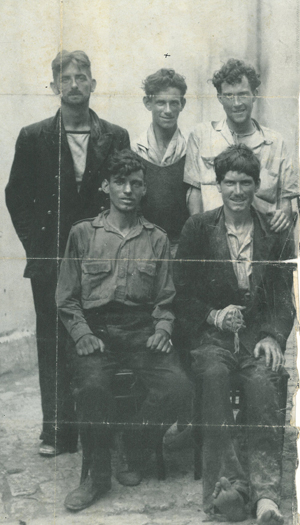19 May 1941
23 DAYS AT SEA IN A LIFEBOAT
One of the great sea odysseys of the war recently ended when 38 survivors of the British liner Britannia, shelled and sunk by a German raider in the South Atlantic on March 25, staggered ashore on the Brazilian island of Curupu after 23 days in a lifeboat. The survivors were 13 English officers and men, eleven Hindu passengers and 14 lascar members of the Britannia’s crew. This picture, which arrived in the U.S. last week, shows the Englishmen shortly after they were brought to the mainland. Their glassy eyes reflect the ordeal. Some are wearing makeshift bandages over their injured hands and feet. Most of them have not yet had a shave. Following is a composite story of several of the British survivors as told last week to a LIFE reporter in Brazil.

THE SURVIVORS’ STORY
Our lifeboat, built to hold 50, had 82 men. We took turns squatting and standing up. The wounded were placed at the bottom of the boat, but two inches of water leaked into the bottom and some of the wounded drowned when their faces were pressed into the bilge by the crowd.
During the first week we saw eight ships. We shouted and burned oil so that might see the smoke. None did. When it rained one day, we filled three buckets with drinking water.
For the next 16 days we sailed the South Atlantic. The heat nearly crazed us and the glare closed our eyes until they were slits. Our skin festered with sores from the sun and salt water. Each morning we dumped overboard the men who had died the night before. At first we buried them with a short religious service, but later we were too weak to do even this.
By the third week men began losing their minds. An Englishman named Smith screamed deliriously for his wife until he died. Those with strength left tried to bail out the boat and clean up the vomit of the seasick men. For food we had a daily ration of one cracker and a spoonful of condensed milk mixed with water. The lascars fought for the leftover cracker scraps. Our mouths cracked from dryness and the English chewed their pipe stems to create saliva. The other men sucked the buttons of their clothes.
After two weeks of sunshine it rained again. We spread sails out to catch the rain and we opened our mouths to let the rain fall in. In desperation, however two Hindus drank salt water and later jumped overboard. We were too weak to rescue them.
On the 19th day the colour of the water changed and strands of seaweed floated by. Land could not be far away, but three more men died that day. By now there was much more room in which to sprawl out, but the legs of some of the men had become so numb from sitting that they could not move over.
On the 23rd day we sighted land! When our navigator saw it, he mumbled: “I have done my duty. You are all safe.” Then he collapsed and died.
Later that day we landed at low tide. Many of the men could no longer walk or talk. They simply collapsed in the mud. The others stumbled further ashore, bowing their heads to thank God for deliverance. If these men had not awakened in time that night, the weaker men, lying in the mud, would have drowned beneath the incoming high tide. Shortly after the weaker men had been dragged to safety, we heard human voices. At the sight of the Brazilian fishermen who found us, some of us fainted with happiness.
(This issue of LIFE Magazine is available on Google Books.)
